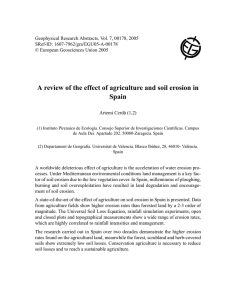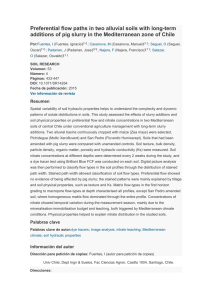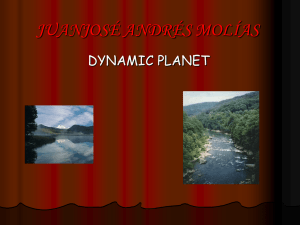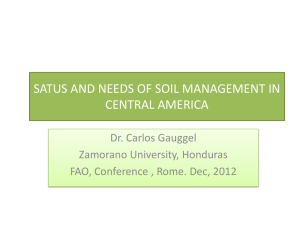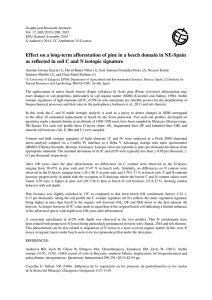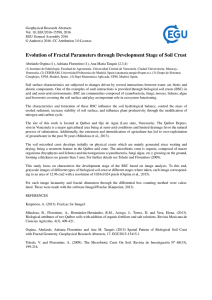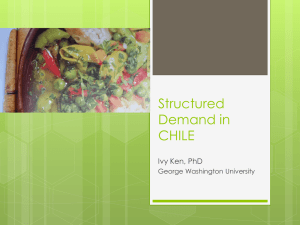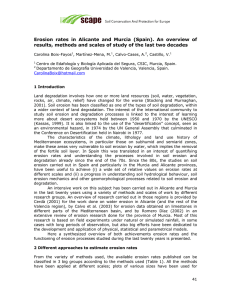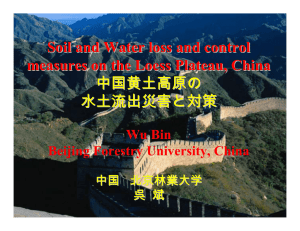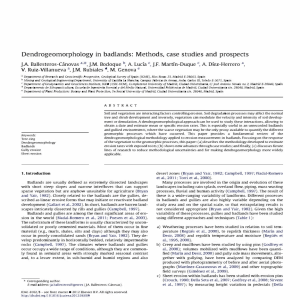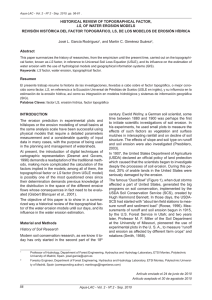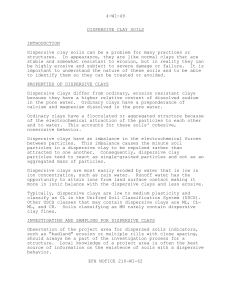Determination of current and potential soil erosion of Chile
Anuncio
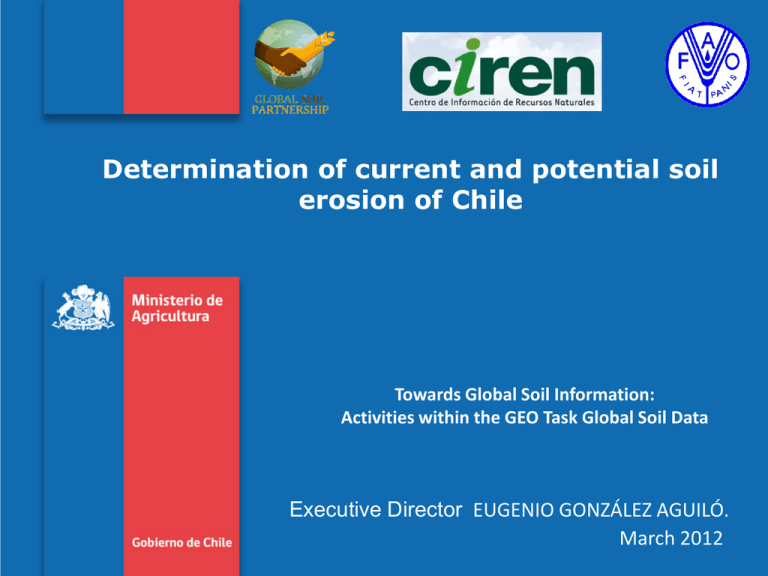
Determination of current and potential soil erosion of Chile Towards Global Soil Information: Activities within the GEO Task Global Soil Data Executive Director EUGENIO GONZÁLEZ AGUILÓ. March 2012 Chile Total Area : 75 mill. Ha Arable land Pastures Forestry plantations Natural forests 5.1 million ha 11.2 million ha 2.3 million ha 13.6 million ha Length: 4,329 km long, equivalent to one tenth of the circumference of the Earth. Chile: environmental macroregions Chilean Antarctica Natural Resources and Agriculture are fundamental for Chilean development 90% World GBP & 63% world population Canadá Unión Europea China Corea del Sur Japón Cuba México Colombia América Central Salvador Costa Rica Guatemala Honduras Nicaragua Ecuador Chile has 22 trade agreements with 59 countries Turquía Estados Unidos Panamá EFTA Islandia Liechtenstein Noruega Suiza P4 Venezuela Brunei Nueva Zelanda Singapur India Malasia Perú Bolivia Mercosur Argentina Brasil Paraguay Uruguay Australia GENERAL PURPOSE To determine current and potential soil erosion for territory of Chile using geomatics and remote sensing techniques. OBJETIVOS ESPECÍFICOS PRODUCTS • Current and potential soil erosion maps. • Soil erosion geodatabase • Publications •Transferring data to partner institutions according to the national forest law and soil conservation system. METHODS Example: Maule Region INTERPRETATION OF SOIL EROSION Severe Erosion Moderate Erosion No apparent erosion Very severe erosion Slight Erosion Santa Laura Valley No Erosión CLASSIFICATION OF SOIL EROSION Slight erosion No erosion Moderate erosion Severe erosion No apparent erosion Very severe erosion North Zone (desert) Nationally, we see that the most eroded soils increase from south to north. An area of 36.8 million hectares, equivalent to 49.1% of the country have some degree of erosion. North Zone The sectors with higher current erosion problems leading the regions of Coquimbo, with 84% of eroded soil, Valparaiso, with 57%, and O'Higgins with 52% of the soils. Atacama Region Not all eroded soil is the product of human action. Most of the soil erosion in northern Chile due to natural causes. South Zone Like other sustainable uses, the native forest effectively protects the soil from erosive agents (water, wind and ice). Araucania Region Here we see soils topography of hills with slopes of 30% to 50% In these conditions of slope, the planting to harvest the soil is fullyexposed to water erosion processes South Zone Soils of mild to moderately undulating topography characteristic ofthe Los Rios, who maintain a permanent vegetation cover for agricultural use. Current exhibit slight to moderate erosion. Central Zone Soil dominant characteristic of rolling hills and the coastal area of the Bío-Bío. Visualizes areas with sparse vegetation cover on soil with ahistory of use and management have created conditions for much ofthe soils present, today, severe to very severe erosion. RESULTS PORCENTAJE (% ) DE SUPERFICIE DE SUELOS EROSIONADOS 0,6% 9,6% 22,8% SIN EROSIÓN 11,1% EROSIÓN LIGERA EROSIÓN MODERADA 13,8% 18,1% EROSIÓN SEVERA EROSIÓN MUY SEVERA EROSIÓN NO APARENTE 9,2% 14,8% OTROS USOS AREAS DE EXCLUSIÓN RESULTS With this project the Ministry of Agriculture of Chile has a nationalgeo-referenced databases of eroded soils at the regional levelprovincial and communal. Cartografía de Erosión Actual Región Maule Cartografía de Erosión Actual Comuna de Pencahue CONCLUSIONS - Update 1979 - 2009 (30 years) - Detailed information by region, province and commune. - Information more accurate results - Satellite Technology - compatibility SSOT - Effort and institutional support for professionals in regions. -General information about development programs and recovery of degraded soils. A serious problem ..... forest fires In the current summer broke ll records of hectares affected by forest fires, many of them caused by human hands. What are we doing…? 1) In the current summer broke all records of hectares affected by forest fires, many of them caused by human hands. 2) It is developing a program for the recovery of degraded soils. 3) By law (Decree 701) is given a grant to fund the planting of forests of introduced species. 4) We are working to change driving habits in praise of the small agriculture sector, especially the goat breeders. Thank you www.ciren.cl
